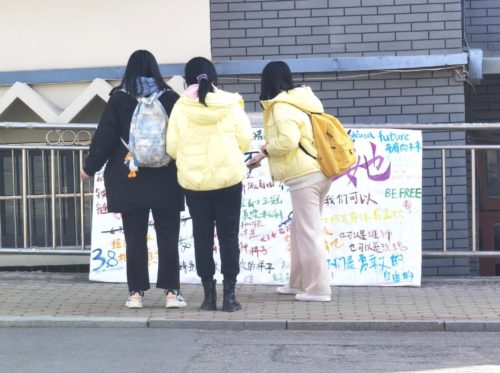Q&A: Catalyst CEO Lorraine Hariton on advancing women in the workplace
We talked to Catalyst CEO Lorraine Hariton about the gender pay gap and stereotypes associated with female leaders.

Women around the world have made great strides in the workplace in the past few decades, but inequality persists. Women are still underrepresented across business. They receive unequal pay for equal work. And they continue to be targets of physical and sexual abuse. The COVID-19 pandemic has put even more of an emphasis on the inequalities women face. Reports show that women are experiencing unpaid work and layoffs more than men, putting them in a vulnerable position. Although protests make noise, society isn’t doing enough collectively.
Lorraine Hariton wants to make a difference. As the president and CEO of Catalyst, a New York City–based nonprofit organization dedicated to accelerating positive change for women, Hariton works with hundreds of companies around the world to address women’s workplace issues and boost the number of women in executive positions. Her extensive career includes senior-level positions in Silicon Valley and leadership roles across the private, nonprofit, and government sectors.
Hariton will be a table host at the The China Project Women’s Conference Gala 2022, which is slated to take place in New York City on May 20. Get your tickets here before they sell out!
Ahead of the event, she spoke with us about Catalyst, the gender pay gap, and stereotypes associated with female leaders.
The China Project: What is Catalyst about? Could you please give us a glimpse of the impact it’s creating in society?
Lorraine Hariton: Catalyst is a global nonprofit supported by many of the world’s most powerful CEOs and leading companies to help build workplaces that work for women. We are celebrating our 60th anniversary year and the great reimagining of leadership and the workplace.
Catalyst helps to create the culture shifts necessary to drive equity for women at work. Six decades ago, Felice Schwartz dared to ask what the workplace could be and founded Catalyst in 1962. She focused on bringing more women into the workforce and enabling them to thrive.
Catalyst is committed to continuing to lead the way by galvanizing our community and providing timely thought leadership, actionable solutions, and impactful conversations that help organizations build a more equitable future for women and for all.
The China Project: How did you get involved with Catalyst? How has your previous experience shaped you as a leader?
Lorraine Hariton: I’ve been a longtime advocate for women’s advancement. I started my career at IBM and held senior-level positions in Silicon Valley as an entrepreneur and executive. I’ve served in the Obama administration at the Department of State and developed the Global STEM Alliance at the New York Academy of Sciences.
I’ve also been a real-time witness and beneficiary of the work Catalyst has been doing for decades to shift the onus from individual women to our larger systems, placing the responsibility on workplaces to evolve.
I was a woman in computer science in the early 1970s when there were few people who looked like me in the field. I was lucky enough to have a professor and a manager who encouraged me and helped me get to where I am. Not only did I learn from them, but they were also models in how to help others.
The China Project: Could you tell us about a stereotype associated with women in leadership that you want to change?
Lorraine Hariton: Women and especially women of color continue to face barriers and bias that are complex and ingrained.
One is the “double-bind” stereotype that men take charge and women take care. Women judged as being too hard, too soft, never just right for the job. Another is generally associated with unconscious bias. Women and men with the same talents and skills are often described in very different ways, creating invisible barriers that can have an enormous impact on women’s advancement.
The China Project: According to a report by the Institute for Women’s Policy Research, it will take until 2059 for women to achieve equal pay based on the current rate of progress. What do you think both men and women can do to help speed up that timeline?
Lorraine Hariton: You can’t improve what you can’t measure. Measurement is critical to creating equitable workplaces. Companies must commit to transparency, measurement, and accountability to close the pay gap.
As a cofounder of Measuring for Change, Catalyst promotes the use of three key performance indicators (KPIs) to help companies measure their progress toward gender equitable workplaces: the percentage of representation on the organization’s board; the percentage of representation by employee category; and the ratio of compensation by employee category.
Building a culture of gender partnership—where people of all genders work together to advance gender equity—is also critical. Catalyst’s MARC (Men Advocating Real Change) has produced transformational programming for many companies, including Chevron, Dow Chemical, and Procter & Gamble.
The China Project: If you have one piece of advice for women in the workplace who are trying to ask for a raise, to negotiate something, or want extra maternity leave, etc., what would that be?
Lorraine Hariton: We need to reimagine systems and policies that can hold women back, rather than focus on what individual women must do. Reimagining the workplace to create workplaces that work for women includes: creating sponsorship programs to help make women more visible as leaders; advocating for the future of work and making flexible work options available; building a culture of gender partnership where people of all genders work together to advance gender equity; and finally, creating inclusive workplaces with empathy at the center. This means leaders must engage their teams and colleagues with curiosity, humility, courage, allyship, ownership, and accountability.





